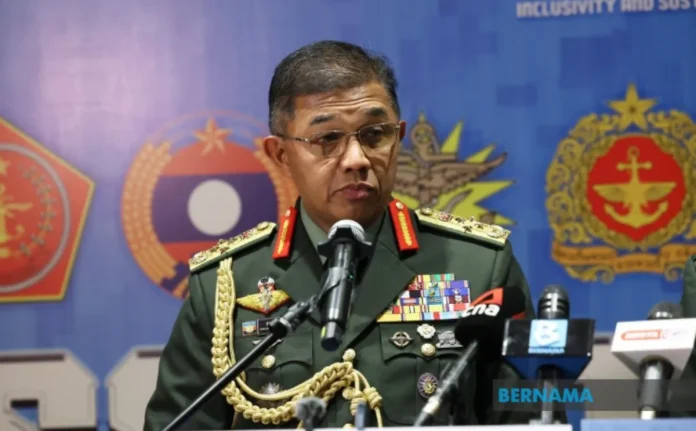ASEAN Observer Team oversees implementation of four-point peace plan between Thailand and Cambodia, including weapons repositioning and demining.
KUALA LUMPUR: The ASEAN Observer Team (AOT) will play a crucial role in monitoring and ensuring the success of the peace plan signed between Thailand and Cambodia.
Malaysian Armed Forces Chief General Tan Sri Mohd Nizam Jaffar said the AOT was officially established through the Kuala Lumpur Peace Accord.
The team comprises military personnel from ASEAN countries tasked with ensuring both nations fully implement four agreed-upon action plans.
“They now have four main action plans that need to be implemented: repositioning heavy weapons back to their original locations, ensuring demining operations are fully carried out, relocating the ‘scam centres’ in Cambodia, and ensuring humanitarian missions are executed,” he said on Bernama TV’s Ruang Bicara programme.
“All four plans must be implemented, only then will Thailand release the 18 Cambodian detainees they currently hold.”
The Kuala Lumpur Peace Accord was signed by Thai Prime Minister Anutin Charnvirakul and Cambodian Prime Minister Hun Manet on October 26.
The signing was witnessed by Prime Minister Datuk Seri Anwar Ibrahim and US President Donald Trump during the 47th ASEAN Summit.
Mohd Nizam said the AOT continues the work of the Interim Observer Team established earlier to monitor the initial ceasefire stage.
ASEAN countries will station 16 personnel in Thailand and 16 in Cambodia through the observer team.
“We are awaiting confirmation for additional members from other participating countries such as the Philippines, Indonesia, Singapore, and Brunei,” he said.
Ensuring both countries comply with the peace plan presents a major challenge for the ASEAN chairmanship, which the Philippines will assume next year.
Mohd Nizam noted that both nations need high trust levels before implementing agreed steps since weapons withdrawal would leave borders exposed.
The effort to eliminate landmines in the border area is expected to take considerable time.
Both countries must first agree on sectors to be cleared before demining operations can begin.
“Until the mine clearance work is completely finished, the process of redemarcating the two countries’ border area, which is one of the causes of the conflict, cannot be implemented,” he said.
Thailand and Cambodia have long disputed their 817-kilometre border, with the latest tension sparking military confrontation on July 24.
On July 28, Anwar hosted a meeting in Putrajaya that successfully eased tensions through a ceasefire agreement.
The ceasefire prevented military conflict escalation and ensured civilian safety, marking a significant ASEAN achievement. – Bernama
ALSO READ: Trump praises Anwar and Malaysia’s role in Thailand-Cambodia peace deal








